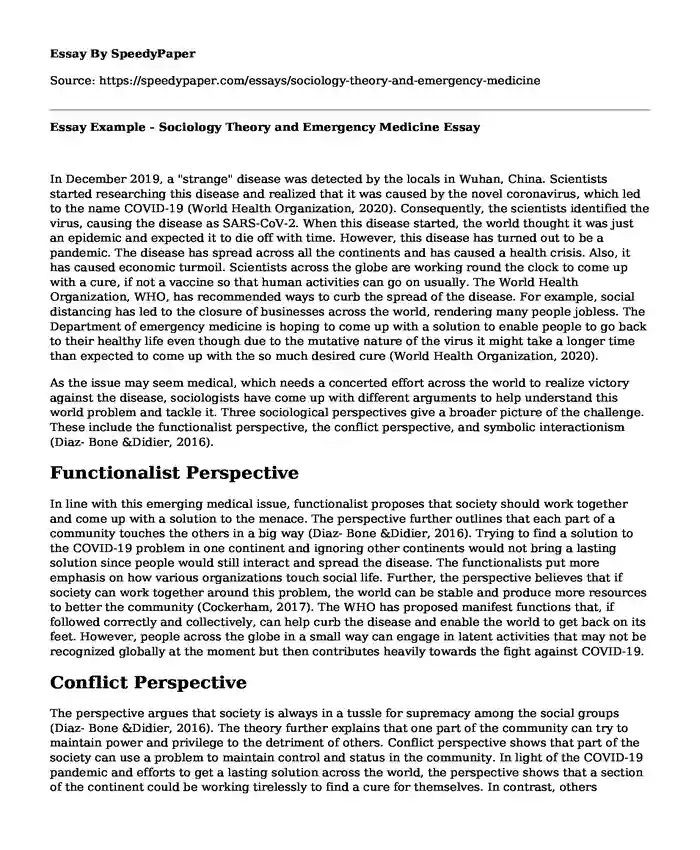
| Type of paper: | Essay |
| Categories: | Human behavior Public health Covid 19 Social issue |
| Pages: | 3 |
| Wordcount: | 715 words |
In December 2019, a "strange" disease was detected by the locals in Wuhan, China. Scientists started researching this disease and realized that it was caused by the novel coronavirus, which led to the name COVID-19 (World Health Organization, 2020). Consequently, the scientists identified the virus, causing the disease as SARS-CoV-2. When this disease started, the world thought it was just an epidemic and expected it to die off with time. However, this disease has turned out to be a pandemic. The disease has spread across all the continents and has caused a health crisis. Also, it has caused economic turmoil. Scientists across the globe are working round the clock to come up with a cure, if not a vaccine so that human activities can go on usually. The World Health Organization, WHO, has recommended ways to curb the spread of the disease. For example, social distancing has led to the closure of businesses across the world, rendering many people jobless. The Department of emergency medicine is hoping to come up with a solution to enable people to go back to their healthy life even though due to the mutative nature of the virus it might take a longer time than expected to come up with the so much desired cure (World Health Organization, 2020).
As the issue may seem medical, which needs a concerted effort across the world to realize victory against the disease, sociologists have come up with different arguments to help understand this world problem and tackle it. Three sociological perspectives give a broader picture of the challenge. These include the functionalist perspective, the conflict perspective, and symbolic interactionism (Diaz- Bone &Didier, 2016).
Functionalist Perspective
In line with this emerging medical issue, functionalist proposes that society should work together and come up with a solution to the menace. The perspective further outlines that each part of a community touches the others in a big way (Diaz- Bone &Didier, 2016). Trying to find a solution to the COVID-19 problem in one continent and ignoring other continents would not bring a lasting solution since people would still interact and spread the disease. The functionalists put more emphasis on how various organizations touch social life. Further, the perspective believes that if society can work together around this problem, the world can be stable and produce more resources to better the community (Cockerham, 2017). The WHO has proposed manifest functions that, if followed correctly and collectively, can help curb the disease and enable the world to get back on its feet. However, people across the globe in a small way can engage in latent activities that may not be recognized globally at the moment but then contributes heavily towards the fight against COVID-19.
Conflict Perspective
The perspective argues that society is always in a tussle for supremacy among the social groups (Diaz- Bone &Didier, 2016). The theory further explains that one part of the community can try to maintain power and privilege to the detriment of others. Conflict perspective shows that part of the society can use a problem to maintain control and status in the community. In light of the COVID-19 pandemic and efforts to get a lasting solution across the world, the perspective shows that a section of the continent could be working tirelessly to find a cure for themselves. In contrast, others continue to struggle to maintain dominance in society, while others remain subordinate to them (Cockerham, 2017).
Symbolic Interactionism
The theory focuses more on the correlation between different people within a society (Diaz- Bone &Didier, 2016). Various guidelines have been put forward by the WHO to help contain the disease. Everyone expects that each person should follow these guidelines and strictly implement them. For example, washing hands after touching surfaces and keeping social distance are examples of guidelines that should be followed (Cockerham, 2017). Everyone should believe that following such guidelines will go a long way in containing the disease hence described as the new normal. Not doing what WHO recommends in society would be seen as deviant behavior.
References
Cockerham, W. C. (2017). Medical sociology. Routledge.
https://www.taylorfrancis.com/books/9781315618692Diaz-Bone, R., & Didier, E. (2016). Introduction: The Sociology of Quantification-Perspectives on an Emerging Field in the Social Sciences. Historical Social Research/Historische Sozialforschung, 7-26.
https://www.jstor.org/stable/43798480World Health Organization. (2020). Coronavirus disease 2019 (COVID-19): situation report, 73.
https://apps.who.int/iris/bitstream/handle/10665/331686/nCoVsitrep02Apr2020-eng.pdf
Cite this page
Essay Example - Sociology Theory and Emergency Medicine. (2023, Aug 20). Retrieved from https://speedypaper.com/essays/sociology-theory-and-emergency-medicine
Request Removal
If you are the original author of this essay and no longer wish to have it published on the SpeedyPaper website, please click below to request its removal:
- Bipolar Disorder Essay Example
- Essay Sample Focusing on Excessive Smartphone Use, Sleep Deprivation and Mental Health
- Free Essay with a Discussion of Staffing Concerns on Ethical Hiring Standards
- Chest X-Ray
- Paper Example. An Evidence-Based Critical Evaluation of Change Leadership Practice in an Organization
- Essay Example on Practicum: Health Disparities
- Free Paper on Navigating Workplace Conflict: Strategies for Effective Communication and Resolution
Popular categories




